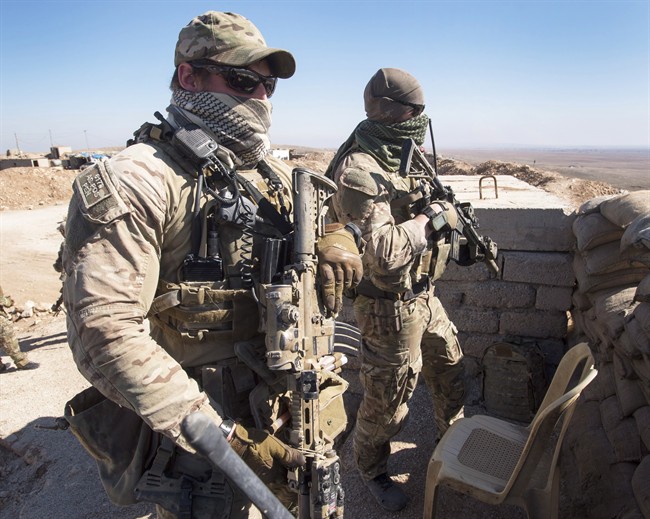The fight to permanently cripple the so-called Islamic State (IS) will require at least another year of hard-fought battles in Iraq and Syria, says the commander of Canada’s joint task force in the region.

Brigadier-General Daniel MacIsaac assumed command of a large number of Canada’s troops linked to Operation IMPACT on March 3, 2017.
In an interview with Global News on Friday, MacIsaac said he fully expects the Canadian mission to be extended beyond the current end-date of June 30, 2017.
“We’re foreseeing that soon, before that date, we’ll receive a new revised mandate,” he said. “I’m sure we’ll continue to be here after the 30th of June.”
The global coalition of 65 countries and three non-governmental organizations fighting IS will need to be in Iraq and Syria for at least another year, he predicted.
WATCH: ISIS training children to be killers

Canadian warplanes with bombing capability were pulled out of the mission by the Liberal government in early 2016, but hundreds of Canadian men and women remain in place to assist with training, reconnaissance, medical operations and other support roles.
The soldiers under MacIsaac’s command remain “far back” from the front lines, he said Friday.
Torture accusations
Meanwhile, a separate contingent of Canadian special forces personnel, not under MacIsaac’s direction, have trained about 2,600 members of the local Iraqi security forces since the mission started. The aim is to prevent a resurgence in IS activity when coalition forces finally pull out.
Special forces troops have also been in the thick of the fighting in the city of Mosul.
READ MORE: Edmonton-based Royal Canadian Air Force squadron deployed to Iraq
The training missions being carried out by various allied countries with soldiers in Iraq have come under close scrutiny in recent days, however, following accusations of killings, torture and other human rights violations against IS fighters by coalition-linked Iraqi soldiers.
Defence Minister Harjit Sajjan has since said that no Canadian soldiers had any direct interaction with the specific Iraqi unit accused of carrying out the horrific acts. One senior Canadian military official called the images published in the Toronto Star of the alleged torture and killings “sickening.”
Focus remains on gaining ground
According to MacIsaac, the shape of Operation IMPACT may change once again as it heads into its next phase.
Operations are still going “relatively well” at the moment, he said, and 55,000 square kilometres of Syria and Iraq have been liberated from Daesh (the coalition’s preferred name for the violent jihadist group) since the fight began three years ago.
“It’s up to the government to mandate how long they’d like us to be here,” he added.
WATCH: Former sex slave makes emotional return to home in Iraq

For now, the focus remains on regaining as much ground as possible, the commander explained. Within its territory, IS has been able to control both people and resources — sources of revenue that ultimately fund the group’s global reach.
Most recently it claimed responsibility for violent attacks in the Philippines and in Manchester, England. It’s unclear if those claims are accurate.
READ MORE: ISIS claimed responsibility for Manchester attack – now what do investigators do?
MacIsaac says that as the group’s territory shrinks, the number of international attacks that they are truly funding or organizing should continue to diminish.
“Daesh has not been successful in directing attacks in some time,” he said.
“They are inspiring some people to conduct attacks such as potentially that in Manchester. But because of the pressure we’ve been putting on them, they’re very much having to focus on the retention of their supposed caliphate, its resources and the control of those people … They’ve kind of reached an imbalance point.”
- What is a halal mortgage? How interest-free home financing works in Canada
- Ontario doctors offer solutions to help address shortage of family physicians
- Capital gains changes are ‘really fair,’ Freeland says, as doctors cry foul
- Budget 2024 failed to spark ‘political reboot’ for Liberals, polling suggests




Comments